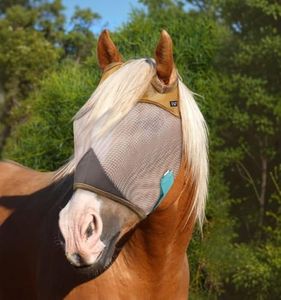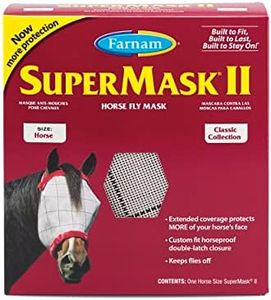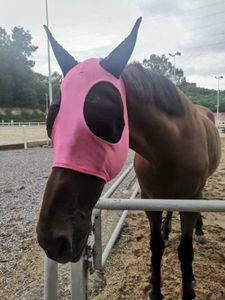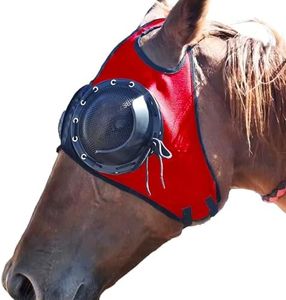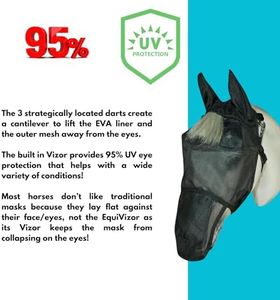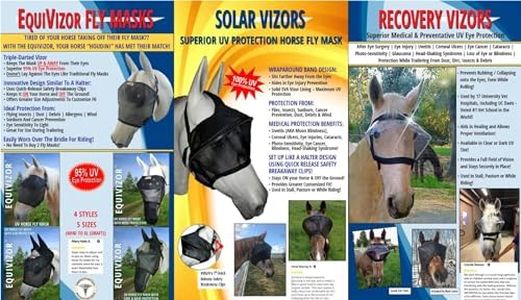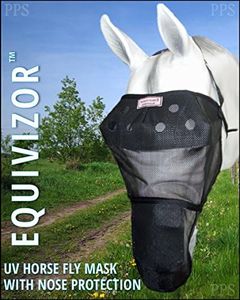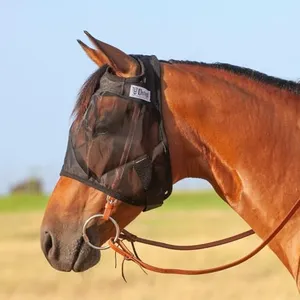10 Best Horse Fly Control Masks 2025 in the United States
Winner
Cashel Crusader Fly Mask, Long Nose and Ears, Grey, Arabian
The Cashel Crusader Fly Mask is a highly-rated option for horse fly control, specifically designed for Arabian horses. Made from soft coated nylon micromesh, it offers a combination of comfort and durability, suitable for long-term wear. Its patented three-hole cap and double-dart design ensure a secure fit while keeping the material away from the horse’s eyes, providing an unobstructed view and accommodating the forelock comfortably.
Most important from
3984 reviews
EquiVizor 95% UV Eye Protection (COB) Standard Horse Fly Mask - Help with Uveitis, Corneal Ulcer, Light Sensitivity. Designed to Stay On Your Horse, Off The Ground.
The EquiVizor 95% UV Eye Protection Standard Horse Fly Mask is designed to provide superior protection for horses with conditions like Uveitis, Corneal Ulcers, and Light Sensitivity. Its standout feature is the high level of UV protection, blocking up to 95% of harmful UV rays, which is excellent for photosensitive horses and those prone to sunburn. The Triple-Dart Vizor design ensures the mask stays away from the horse's eyes and face, which can enhance comfort and reduce irritation compared to flat masks.
Most important from
410 reviews
Top 10 Best Horse Fly Control Masks 2025 in the United States
Winner
9.8 score
Cashel Crusader Fly Mask, Long Nose and Ears, Grey, Arabian
Cashel Crusader Fly Mask, Long Nose and Ears, Grey, Arabian
Chosen by 1296 this week
EquiVizor 95% UV Eye Protection (COB) Standard Horse Fly Mask - Help with Uveitis, Corneal Ulcer, Light Sensitivity. Designed to Stay On Your Horse, Off The Ground.
EquiVizor 95% UV Eye Protection (COB) Standard Horse Fly Mask - Help with Uveitis, Corneal Ulcer, Light Sensitivity. Designed to Stay On Your Horse, Off The Ground.
EquiVizor 95% UV Eye Protection (XL) Horse Fly Mask with Ears/Nose. Helps with Uveitis, Corneal Ulcer, Light Sensitive. Designed to Stay On Your Horse, Off The Ground.
EquiVizor 95% UV Eye Protection (XL) Horse Fly Mask with Ears/Nose. Helps with Uveitis, Corneal Ulcer, Light Sensitive. Designed to Stay On Your Horse, Off The Ground.
EquiVizor 95% UV Eye Protection (Full) Horse Fly Mask with Nose - Help with Uveitis, Corneal Ulcer, Light Sensitive. Designed to Stay On Your Horse, Off The Ground.
EquiVizor 95% UV Eye Protection (Full) Horse Fly Mask with Nose - Help with Uveitis, Corneal Ulcer, Light Sensitive. Designed to Stay On Your Horse, Off The Ground.
Rambo Rambo Plus Fly Mask Oatmeal/Sage HORSE
Rambo Rambo Plus Fly Mask Oatmeal/Sage HORSE
Our technology thoroughly searches through the online shopping world, reviewing hundreds of sites. We then process and analyze this information, updating in real-time to bring you the latest top-rated products. This way, you always get the best and most current options available.














